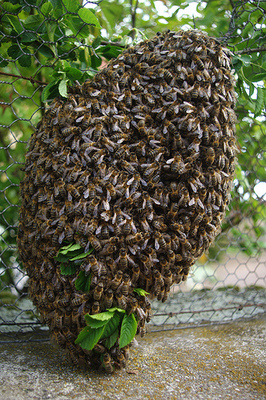Honey bees regularly swarm in order to expand their numbers and move to new homes. Swarming is where the queen in a colony leaves, accompanied with around a third to a half of the colony, in order to set up a new home elsewhere. The queen will leave several new queens developing in the old hive, one of which will take over the colony.
Swarms can mostly be avoided with modern beekeeping techniques - however hives will occasionally still swarm, and swarms can originate from other apiaries in the area, and from feral colonies.
Swarms are generally quite calm and unlikely to 'attack' people - however, you should follow the advice below if you encounter a swarm:
- Do not approach the swarm.
- Do not make any loud noises.
- Move slowly and deliberately - don't make any sudden movements.
- Leave the area and Contact a beekeeper to deal with the swarm.
If you are stung, then seek first aid assistance. In the case of a large number of stings, or a severe allergic reaction, seek medical assistance immediately!
If you encounter a swarm away from the University, contact either the University's Beekeepers, or the Edinburgh & Midlothian Beekeeper's Association who will be able to put you in touch with a beekeeper in your area. If all else fails, please see our Links page for Pest Control Services.

